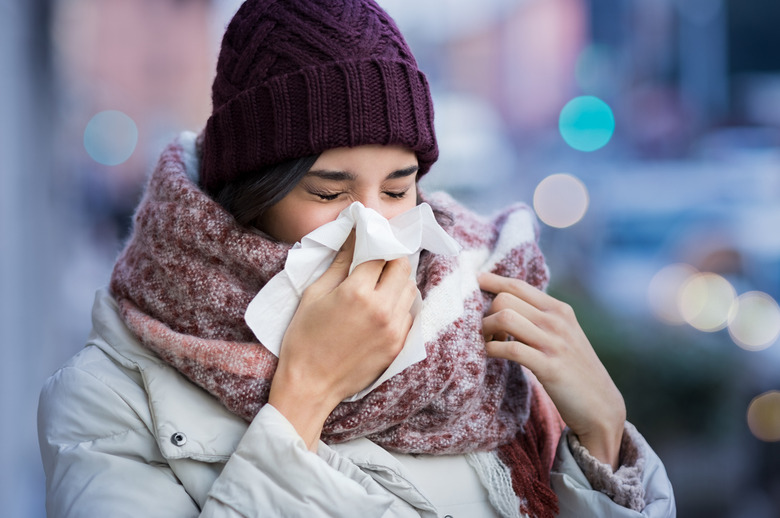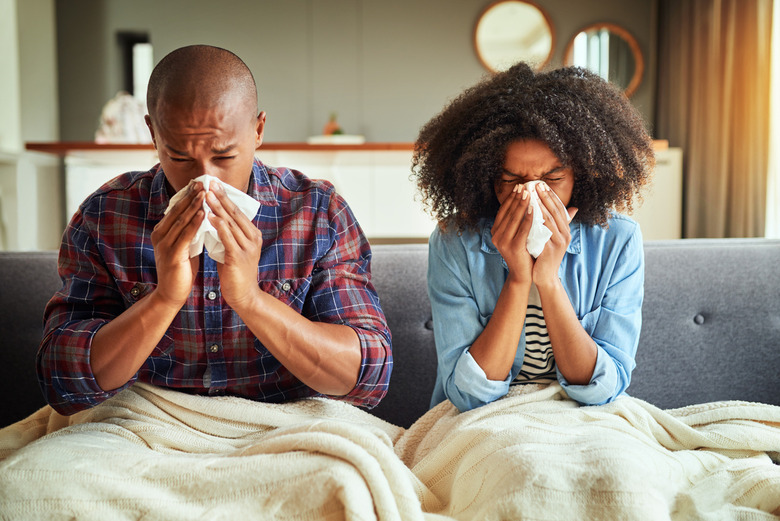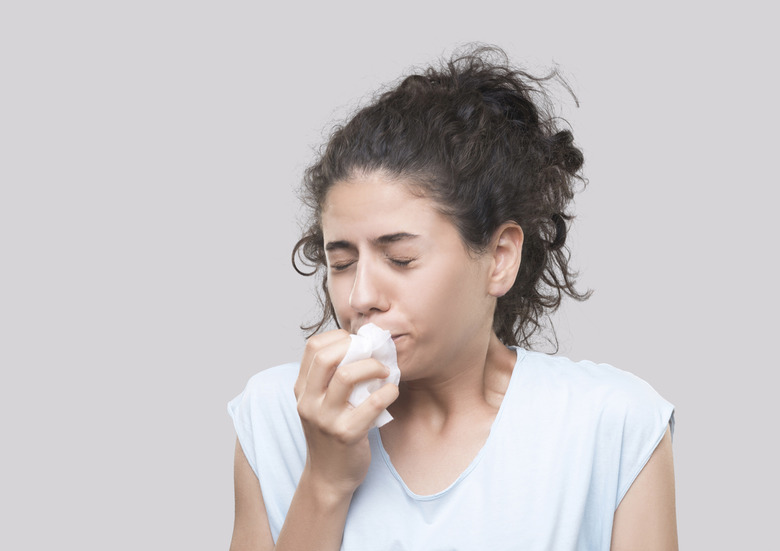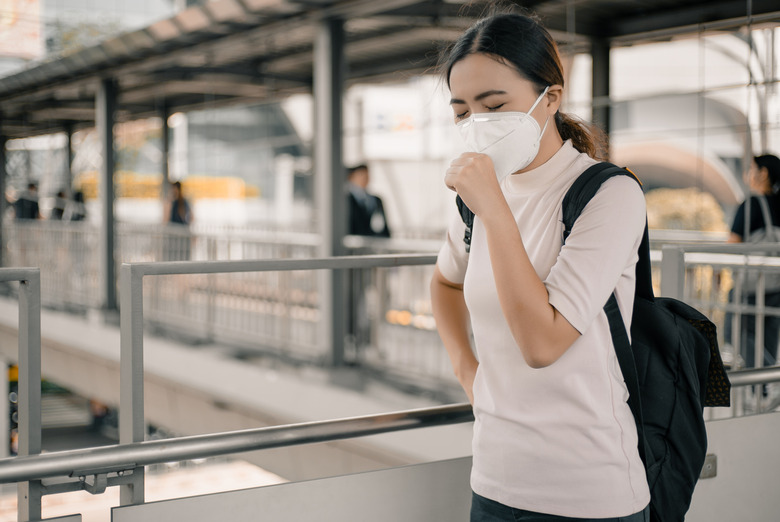Weather Makes You Sick, And Other Cold And Flu Myths Debunked
The cold and flu are two of the most common illnesses people experience each year. According to the Centers for Disease Control and Prevention, the average adult catches between 2 and 3 colds each year, and around 8 percent of Americans get sick with the flu each year. But how much do you really know about these common illnesses?
Some Americans have trouble telling the difference between the two. Though it's true that the two illnesses have similar symptoms, the flu is much more serious than a cold. And there are key differences between cold and flu symptoms to watch out for. But that's not the only source of confusion. How many of these common myths about the cold and flu do you believe?
Your heart stops when you sneeze
Why do we say "Bless you!" when someone sneezes? Popular myth says that your heart stops when you sneeze, prompting the need for a blessing. However, your heart does not stop every time you go "achoo!" It could flutter a bit — among all the other things that happen to your body when you sneeze, your heart rhythm is sometimes disrupted due to your quick inhale and the response from the muscles in your chest.
Weather makes you sick
The seasons affect your body in weird ways, but causing a cold isn't one of them. Being outside in cold weather is not what causes you to come down with a cold. Colds spread through contact with viruses. No matter the weather, unless you are infected from an airborne virus or through contact with a contaminated surface, you will not get sick. Wet hair or dry hair, snowy or sunny, a virus must infect you for you to get sick. However, cold weather could make these viruses more common. According to research by the American Society for Microbiology, rhinoviruses (viruses that cause the common cold) replicate more efficiently at lower temperatures. And a study published in the journal Viruses showed that lower temperatures and decreased humidity both correlated with a higher risk of infection with a cold.
Green or yellow mucus means you have an infection
Some people believe that green or yellow mucus, as opposed to clear mucus, is a clear sign that your sniffles are more than just a cold and are actually signaling an infection. However, this hue doesn't come from bacteria. Your snot sometimes changes color because certain enzymes in white blood cells released during an immune response are slightly green. So green or yellow mucus is actually just a sign that your immune system is working hard to fight off illness.
Dairy makes your runny nose worse
Anecdotally, some say that drinking milk or eating dairy products makes congestion worse. But can this actually happen? While there are some foods you want to avoid when you're congested, milk and other dairy products do not actually cause your body to produce more phlegm. This myth was debunked over 50 years ago by a study published in California Medicine. After examining over 600 patients, researchers concluded that no, milk does not increase mucus production.
The flu shot can give you the flu
Some people are apprehensive about getting a flu shot because they believe that the flu shot could potentially give them the flu. But this is false. Flu vaccines deliver either a weakened or completely deactivated version of the flu virus. These viruses cannot spread enough to get you sick, according to the CDC.
People with egg allergies can’t get flu shots
Previous recommendations instructed people with egg allergies to steer clear of flu vaccines and/or receive supervision for 30 minutes afterward. The CDC changed its recommendations, however, after studies showed how incredibly unlikely allergic reactions to the vaccine really were. For the rare case of a severe and life-threatening egg allergy, the vaccine should be administered in an inpatient or outpatient medical setting where the patient can be monitored for a reaction. People with egg allergies can get the inactivated influenza vaccine (IIV), recombinant influenza vaccine (RIV), or live attenuated influenza vaccine (LAIV) that are appropriate for their age.
After a couple days your cold isn’t contagious
Many people believe that you are only contagious at the start of your cold. However, you could still be contagious even near the end. According to the National Health Service in the United Kingdom, you could be contagious until your symptoms disappear. Quarantine yourself accordingly.
Sneezes blow snot at 100 miles per hour
According to an investigation by MythBusters, a typical sneeze travels at closer to 30 to 40 miles per hour. However, according to a book called "Zoom" by astronomer Robert Berman, the fastest sneeze ever recorded clocked in at 102 miles per hour. So your sneeze could be that speedy — it just isn't very likely.
Feed a cold, starve a fever
As the popular saying goes, you should "feed a cold, starve a fever." But you should really be eating and drinking enough water in both scenarios, fever or not. Poor nutrition is not going to help you get better. Nutrients help to support your immune system so that it can function properly while you fight off illness.
Loading up on vitamin C will help you get better faster
Lots of people do this: They notice they have a cold and start drinking tons of orange juice and vitamin C solutions, hoping it'll help them get better. While vitamin C is an essential nutrient that you might not be getting enough of, adding a ton of it to your diet all at once isn't going to do much good to get rid of your cold. For one, you're only able to absorb a certain amount of vitamin C at a time. So a lot of that vitamin C is going to pass through your system unabsorbed. Research from the University of Helsinki showed that taking vitamin C did not have a consistent effect the duration or the severity of a cold.
Taking cold medicine will help you get better faster
According to the Mayo Clinic, over-the-counter cold medications can lessen the severity of cold symptoms. However, it won't make them disappear faster. You'll still be sick for just as long, you simply won't have as hard a time getting through it.
You should take antibiotics to cure a cold
Even if your cold is a particularly nasty one, antibiotics won't help. The common cold is a virus; antibiotics work to kill off bacteria. According to the Mayo Clinic, it's ill-advised to ask your doctor for antibiotics if you have the common cold. You may want to try sipping on a soothing beverage that could help fight your symptoms instead.
If you’re healthy you don’t need a flu shot
No matter how healthy you are and how much vitamin C you take, you should still get a flu shot. The CDC instructs that everyone over the age of six months, with a few very rare exceptions, should get a flu shot every year. Before you get it, though, here are a few things you should know.
The flu vaccine will guarantee you won’t get the flu
While the flu vaccine can't give you the flu, it may not protect against it entirely. There are many different strains of the flu virus, and they are mutating all the time. While the most common strains of the virus will likely be protected against by a vaccine, other more rare strains may still get you sick.
You don’t need a flu shot every year
A flu shot is not a "one and done" situation. Even if you got a flu shot last year, you still need one this year. There are two main reasons for this, according to the CDC. Your immunity to a virus declines over time, so the flu shot from last year won't still be keeping you immune a year later. Additionally, the flu shot formula changes from year to year based on the strains of the virus that scientists find are in circulation.
The flu isn’t that serious
The severity of flu symptoms vary from person to person. While some people don't have a hard time getting over the flu and may just need a few days' rest at home, others' illness may be more serious. Additionally, some populations are at a much greater risk for flu-related complications, such as those with an autoimmune disease, those with asthma, pregnant women, diabetes patients or the elderly. The CDC estimates that there have been between 12,000 and 79,000 flu-related deaths annually since 2010.
Once you get the flu you’re immune
If you've already caught the flu, you are not immune to the virus. You are likely immune to that specific strain of the virus — but you could encounter a different strain later in the season.
The ‘stomach flu’ is a type of flu virus
Though you call it the "stomach flu," it's not actually the flu. The stomach flu is gastroenteritis — an infection caused by a variety of viruses, none of which are influenza. When you're infected by the flu virus (influenza), your symptoms are much different. The flu virus attacks your respiratory system, resulting in coughing, sore throat and other symptoms you associate with colds and the flu. The viruses that cause the "stomach flu," however, attack your intestines. These viruses cause symptoms such as vomiting and diarrhea.
You can sweat out a cold or the flu
When sickness gives you chills, you probably feel like you need to bundle up. But once you do, you may still sweat and shiver under the covers. Some believe this might not be so bad, since you can "sweat out" your sickness. But this is false — the American Academy of Pediatrics does not mention sweating or external temperature manipulation as an effective method of combating a fever. And sweating profusely will likely just make you more dehydrated.
It’s OK to send your kid to school if they don’t seem that sick
Even if the symptoms of your child's cold aren't that bad, they could still be contagious. That means they should stay home from school so they don't spread the virus to their peers. But how long should you keep them home? Here's when nurses say it's OK to send your kid back to class.




















